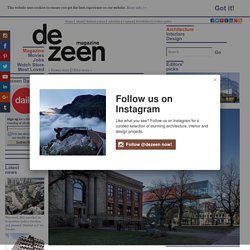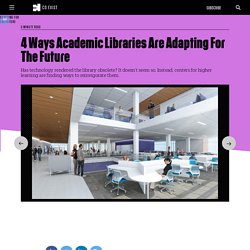

2014 nmc horizon report library EN. Independent Library Report 18 December. The Future of Libraries Has Little to Do with Books. Halifax Central Library features stacked glass boxes. Schmidt Hammer Lassen Architects stacked up cuboid volumes with different dimensions and cladding finishes to create this library in Halifax, Canada (+ slideshow).

Danish firm Schmidt Hammer Lassen Architects collaborated with local office Fowler Bauld & Mitchell on the design for the Halifax Central Library after winning a 2010 international competition for the redevelopment of the city centre site. Located at a crossroads in one of Halifax's most historic neighbourhoods, the building's four rectilinear volumes have been orientated to follow the angles of the adjacent streets.
"Halifax is a city whose maritime heritage calls for attention when designing a new public building," said Morten Schmidt of Schmidt Hammer Lassen Architects, who also recently completed a library in the Canadian town of Edmonton. Each of the rectangular blocks features large areas of glazing, designed to offer plenty of visual connections between the interior and the surrounding streets. Photography is by Adam Mørk. BiblioTech - Bexar County's Digital Library. שבעים ושנים זקנים: עתיד הספר, עתיד הספריות. Image by Getty Images via @daylife מאז שנכנס השימוש ברשת האינטרנט לספריות, השאלה לגבי עתיד המקצוע לא יורדת מסדר היום.

דיברו על זה כשהייתי סטודנט וממשיכים לדבר על זה גם היום וכנראה גם בשנים הבאות. בין הנקיונות לפסח, הרהרתי בנושא בעצמי והנה השקפתי בינתיים בעניין. השאלות תמיד חוזרות על עצמם: למה צריך ספריה, הכל נמצא ברשת? למה צריך ספרנים ומידענים, אני יודע לחפש בגוגל בעצמי? למה צריך ספריה פיזית, יש הרי ספרים אלקטרוניים, Google Books? אז כך, לדעתי המקצוע שלנו לא הולך להיעלם בשנים הקרובות. לא, לא הכל נמצא באינטרנט. נכון יש יותר ויותר התייחסות לכתבי עת ב open access אבל יקח המון זמן עד שכתבי העת החשובים ביותר יעברו לשיטה זו.
לכאורה השימוש במאגרי המידע ובקטלוגים של ספריות אמור להיות פשוט, והוא באמת כך. להפתעתי הם עדיין לא יודעים להבדיל בין חומר אקדמי לחומר פופולרי ולהבין איך בעצם אמורים לבצע איסוף מידע לטובת עבודה סמנריונית. מאגרי המידע ממשיכים בנסיונות להפגין נוכחות "גוגלית" אבל עם כל הכבוד EBSCO, Science Direct, ProQuest וכל השאר אינם גוגל. גם הספר הפיזי ומבנה הספריה לא הולכים לשום מקום. 4 Ways Academic Libraries Are Adapting For The Future. For academic institutions seeking to thrive amidst the constantly shifting world of higher education, libraries have become the heart of the spirit of collaboration and innovation—going beyond being places to merely access knowledge to become hubs to truly explore and create.

The institutions at the frontlines of this change are thinking beyond the days of the library as a collections repository to something much more powerful. At a recent meeting with the University of Virginia Executive Vice President and Provost John Simon, he described the library as the great "Intellectual Convener. " Despite all the dire predictions for the future of academic libraries in the digital age, when people believed the digitalization of print and other emerging technologies would make them irrelevant, universities around the country are evolving their libraries and intellectual centers into catalysts for discovery, learning, collaboration, and scholarly breakthroughs.
Libraries Must Embrace Flexibilty. Coffee is only the start of the future of our libraries. “Libraries should be more like coffee shops.”

The headlines following last month’s publication of the Independent Library Report for England by the Department for Culture, Media and Sport unfortunately managed to trivialise a vital blueprint for the future of the UK library service. The sensible suggestion by William Sieghart and his panel that all public libraries should have Wi-Fi (and coffee and lavatories) is just part of the plan for how to revitalise libraries in a digital age.
Now, before anyone secretly thinks: “Do we really need libraries now everyone’s got Kindles/Wikipedia/Google?” , a view that is not confined to below the line on the Telegraph website but shared by many in the political establishment, let’s get a few things clear. Despite massive cuts to budgets and opening hours over the past few years, a third of the population uses libraries (50% in poorer areas). As the report emphasises: “Libraries offer more than just books, CDs and DVDs. Forecasting the Future of Libraries 2015. I used to think being trendy was a bad thing—a sign of someone who lacks individuality or perhaps is fickle.

But in a world of rapid change where people are more and more aware of the latest technology, news, and innovation, being trendy—or at least knowing what’s trendy—is almost essential. In 2013, the American Library Association (ALA) announced the formation of a Center for the Future of Libraries. The project, initially supported by a grant from the Institute of Museum and Library Services (IMLS), focuses much of its work on identifying emerging trends relevant to the libraries, the librarians, and the communities they serve. Why trends? Well, as many of us already know, it’s nearly impossible to accurately predict the future.
Many libraries and librarians have already proven their exceptional ability to spot trends and integrate them into their programs and services. About the World Innovation Foundation.